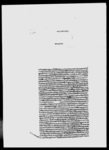A report from Patna by Candraśekhara Upādhyāya re Gajarāja Miśra's death and British overtures of friendship (VS 1874)
ID: DNA_0002_0111
Edited and
translated by Manik Bajracharya, Simon Cubelic, Rajan Khatiwoda
Created: 2019-04-01;
Last modified: 2019-09-15
For the metadata of the document, click here
The accompanying edition, translation/synopsis and/or commentary are available under the terms of the Creative Commons Attribution-ShareAlike 4.0 International License
Abstract
This is a letter sent by Candraśekhara Upādhyāya to General Bhīmasena Thāpā from Patna reporting about Gajarāja Miśra's death and administrative matters. He also states that the British are interested in establishing friendly relations with Nepal and that they are actively engaged in resolving troubles in the south.Diplomatic edition
[1r]
श्रीदुर्गाजीसहाय\⟪नं२३१⟫श्री५महाराज1स्वस्तिश्रीसर्वोपमायोग्यशौर्यौदार्य्यदयादाक्षिण्यादिगुणगणालंकृतराजभारसमर्थ2श्रीश्रीश्रीजनरलभीमसेनथापामहाशयेषुतथाश्रीश्रीश्रीकाजिरणध्वजथापाकेषुइतःशुभे
3छुचंद्रशेखरउपाध्यायकोशुभाशीर्वादपूर्वकंपत्रंकृपालेञाहाँआनन्दहोलाताँहाँकोआ
4नन्दमंगलसर्वदाचाहियेयेहितेप्रभुसेवकजनसवकोपालनाहोलाआगे∙ञाहाँकोस
5माचारयथास्थितछ उप्रान्त∙श्रावणसुदि९रोज५कामितिमाताँहाँवाटरव़ानाभयाको
6चिठिभाद्रवदि४रोज७कादिनआइपुग्योपह्रिअर्थविज्ञातभय़ो∙लाठसाहवसितभेट
7मुलाकातवातचितभयाकोर∙मिश्रज्यूविरामहुनुभै∙परलोकीहुनुभयाकोविस्तारअ
8घिअघिकाअर्जिचिठिलेविस्तारवुझ्यागयोहो∙मिश्रज्यूजानुभयाकोछ१।२काम्निस्क
9नन्भन्याहामिसवकाचित्तमाभरोसाथिय़ोअकस्माद्दैवलेएस्तोपार्योचित्तमावहुत्षे
10दलागीरहन्छपरन्तुआफुलेटालिनटल्न्याईश्वरेछालेमात्रहुन्याकुराहुनालेचित्तमा
11धैर्यलिसंझनुपर्न्यारहेछसोइपाठलेचित्तलाइसंझाइ∙ञाँहाभैपरिआयाकोरताँहावा
12टहुकुम्आज्ञाआयामाफिक्जान्यावुझ्यासंमकोटहलगरिन्छ- - - ञाहाकाअर्थलाइ∙नयो
13दोस्तिभैरहेछहाल्इन्कोतरहदेष्ता∙ठूलैदोस्तिराष्याजस्तोगर्छन्वढियैछ∙दक्षिणीसित
14वात्चितैलेवन्दोवस्तहुन्छकिकसोहुन्छसोजैल्हेञाँहावातषुल्लाविन्तिगरीपठाउँला∙
15जान्आदम्साहवरसुइन्टीनसाहवसितभयाकाकुराकोविस्तारअघिपार्सिकाचिठिमा
16लेष्याकोहोजाहरभयोहो∙सर्कारीकमराकोकुरा∙अघि⟪जान्⟫आदम्साहवलेगर्याथ्यापछिञा
17हाहामिछेउकसैलेभन्याकोछैन∙वाहिरा१।२मानिस्काजुवानिसाविक्सिवानामाफि
18क्फलानुजगानेपालका ¯¯¯ ¯¯¯ ¯¯¯ लाइलाठसाहवकाहुकुम्वमोजिम्पर्वानाअदाल
19तकाकचहरीमाभैरहेछभन्न्याकुरासुनिरह्याछन्∙वल्जलिसाहवकलकत्ताकूचगर्या
20हामिगर्मिलेनिस्क्याकाथिञुन∙अवरताँहाँविन्तिगरीपठायाको∙हाजिर्वासीकोमुष्ता
21रनामाषलीतारतनुषाभयाकोषर्चपनिआइपुग्लागर्मिपनिवीत्यो∙कलकत्ताहि
22ड्दिषेरञाहाँकाअपील्वालारजज्सितभेटगर्नुछ∙तेसैमाइकुरापनिगरिजोठगान्
23होलाविन्तिगरीपठाउँला∙हाति२पठाइदिनुभयाकाहिजोहाजिपुरआइपुग्याछन्आ
24जदानापुरकप्तान्हिल्साहवछेउषवर्पठाञा∙उन्लेमानिस्पठाउनिमात्रै∙हातिसौप
25न्याकामहोला∙इनहरूकामानिस्काजुवानि∙इहाथि∙हालुक्वाडिमापठाउन्याकुरासुनि
26न्छन्तर२हथिनीदेष्ताफीलवान्इनहरूकावेस्रह्याछन्∙इत∙दानापुरैरहनन्भन्थ्यागरे
27पछिपठाइवक्सनुभयाका∙झन्वढियारह्याछन्∙षुशीहुनन्∙सुइन्टीनसाहवसित
28भेटहुँदाषुकुरीकावीडकाप्रसंगमा∙गैँडातिम्रातराइकाजंगलमाहुन्छन्भन्दासुनिंन्छ
29पाल्पाकापनिछन्किभन्न्यावडासाहवलेहेर्न्याकुराचित्तमाराष्याजस्ताडव़ल्काकुरा
30गर्थ्या∙१अनुठाघोडाकापनिताँहाँकुराआज्ञागर्नुभयाकोहो∙सोघोडाआयाकोभया
31तेस्कासाथमा१गैंडापनिपठाउन्याकाम् भयावढियाहुदोहोभन्न्याचित्तमाआँउछ∙
32जोआज्ञा∙मुन्सिअमृत्लालआइपुग्याकोषवर∙अघिकाचिठिमालेष्याकोहोविज्ञा
33तभयोहो∙दर्माहा थोडोभयोउस्जगामातेस्दर्माहलेकसोगरीनिर्वाहहोलाभनि∙
34आगापीछागर्छन्∙जोअघितज्वीजभयाकोगराइवक्सनुभयावढियाहोला∙मलाइ
35पनिधेरर्दिन्ञाँहारहन्याकामकेहिछैन∙षर्चषलीताचाँडोवक्सिपठाउनुभया∙त्यो
36आइपुग्निमात्रकूचगरूलाविज्ञेषुकिमधिकमितिभाद्रवदि६रो∙२सं∙१८७४साल
37⟪मुकामपटनाशुभं⟫
Translation
[1r]
May glorious Durgā protect [us]
No. 2311
Five times venerable Mahārāja2
Hail! This is a letter from your well-wisher Candraśekhara Upādhyāya3 with auspicious blessings from here to the thrice venerable General Bhīmasena Thāpā, the magnanimous one, who is worthy [to be an object] of all [exalted] similes, being adorned with a multitude of qualities—heroism, generosity, compassion, skillfulness and the like—and who is able to shoulder royal duties, and to the thrice venerable kājīRaṇadhvaja Thāpā.
Things will be joyful here with [your] grace. The joy and good fortune there is always required. Everyone who is your servant, my Lord, will be protected [by you]. Furthermore, the tidings here are as before.
Uprānta: The letter that was despatched on Thursday, the 9th of the bright fortnight of Śrāvaṇa from there reached here on Saturday, the 4th of the dark fortnight of Bhādra. I read and understood its meaning. You must have understood, from the earlier letters, the details about the meeting and conversation with the Lord Sāheba, and about the sickness and death of Miśra4 . Miśra has passed away. There was hope in all of our hearts that he would be able to accomplish 1 or 2 more tasks. Suddenly, fate struck. I feel much sorrow in my heart. However, since it is something that can only happen by the inescapable will of God, one must understand and remain firm of mind. This lesson has made my heart understand; I shall serve to the best of my knowledge based on what happens here and on the orders coming from there (i.e., from you).
Regarding matters here, a new friendship is being formed. To judge by their current behaviour, [the British] are acting as if they had [already] sealed a great friendship [with us], which is fine.
Regarding whether there will be an arrangement with the Southerners5 through talks, I shall inform you as soon as the matter becomes clear here. The details of the conversation with John Adam Sāheba6 and Swinton Sāheba7 were written [to you] earlier in the Persian letter. You will have taken cognizance of them. John Adam Sāheba had earlier talked about the government chambers (sarakārī kamarā). No one has talked to us about it since then. It has been heard from 1 or 2 persons outside (the government?) that an order (parvānā)—in line with a command from the Lord Sāheba that such and such land be [returned] to the fivefold venerable king of Nepal based on the former (sāvik) borders—is currently being [discussed] in the court assembly.
Valjali Sāheba8 has departed for Calcutta. We didn't leave because of the heat.
The appointment letter (mukhtāranāmā) for the resident's attendant (hājirvāsī), the kharitā and the sum for salaries that we had requested from you ought to be arriving. Summer has also passed. Around the time I set off for Calcutta, I will need to meet the appellant and the judge here. During the meeting, I will talk [with them] about this matter and will inform you about whatever is decided.
The 2 elephants that you sent arrived yesterday in Hājipura9 . Today I sent the news to Captain Hill Sāheba in Dānāpura10 . The handing over of the elephants will only happen after he sends his people. It is heard from their people that these elephants will be sent to Hālukvāḍi. However, judging by the 2 female elephants, their mahouts (phīlavān) are better [than expected]. They said that they (i.e., the female elephants) will remain in Dānāpura. The ones that you sent later are even better. They (i.e., the British) will be happy. When I met Swinton Sāheba and we were talking about the hilt of a khukuri, he said: "I have heard that rhinos can be found in the forests of your [part of] the Tarai. Can they also be found in Palpa ?". He twice mentioned that the Baḍā Sāheba has the wish to see [them].
There [in Nepal], you gave the order [to send] 1 special horse as well. If that horse comes11 , it occurs to me that it would be [even] better if you could also send 1 rhino together with it. [I will be satisfied, though, with] whatever you order. I wrote in my earlier letter the news of Munsi Amṛta Lāla's arrival. You may have [already] known [about it by now]. He is after me saying: "The wages are not enough. How can one survive in this place on such wages?" It would be great if you could grant what was decided before. And as for me, there is no purpose in remaining here for many days. I will depart [from here] once the kharitā with the money [for salaries], that you will [hopefully] send quickly, arrives here. What more [to say] to a knowledgeable one. Monday, the 6th of the dark fortnight of Bhādra in the [Vikrama] era year 1874 (1817 CE). Residence: Patna. Auspiciousness.

